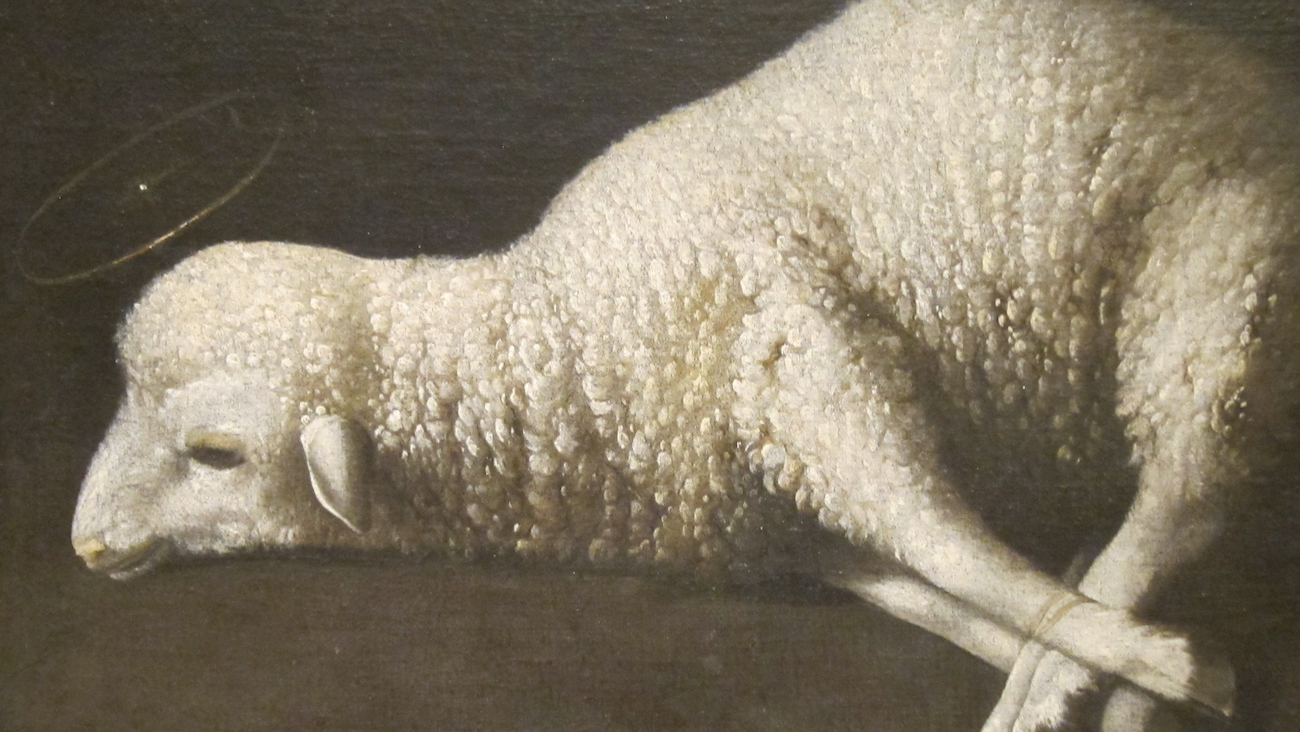In the town of Werden in Germany, there’s a stone carving of a lamb on the roof of the Catholic church. That’s an unusual place to put a statue, as few people will see it up there, but in this case the roof was the appropriate location—due to an event that happened when the church was being built hundreds of years earlier. A man was working on the roof of the church when his safety rope snapped, sending him headlong into the churchyard below. The yard was cluttered with large stone blocks left over from constructing the walls, and posed a deadly hazard—but the workman fell between two of them; he wasn’t seriously hurt, and suffered only a few bruises. The reason for his apparently miraculous survival was somewhat sad: a lamb was in between the blocks, nibbling grass. The man fell right on top of the lamb, instantly killing it, but the animal’s body cushioned his fall, saving him from a fatal accident. In gratitude, the workman, on his own time, carved a statue of the lamb and placed it on the roof as his tribute to the animal which had unknowingly preserved his life (Msgr. Arthur Tonne, Five-Minute Homilies, p. 11).
A lamb saved the life of a man in Germany. Jesus is the Lamb of God Who came for the salvation of all mankind. In our gratitude, we’re not expected to carve a statue of Him and put it on the roof of our houses; it’s far more important that we place His will at the center of our lives and that we share His truth and love with the world.
When St. John the Baptist referred to Jesus as “the Lamb of God, Who takes away the sins of the world,” his listeners would have understood the example he was using. At the Temple in Jerusalem, lambs were frequently offered in sacrifice, and an unblemished lamb was prepared for the Passover celebration every year by devout Jewish families. These rituals were a reminder and representation of God’s ability to save His people and free them from their sins. John the Baptist proclaimed that Jesus Himself would fill this role; He would be the sacrificial lamb whose blood washes away human sinfulness.
The image of Christ as a Lamb is used throughout the New Testament; the Book of Revelation, for instance, refers to Jesus as the Lamb some twenty-eight times, and speaks of His glory and absolute power in overcoming all the forces of this world and all the servants of evil. Jesus is the Lamb, once slain, Who is now completely victorious, thereby fulfilling the prophecy from the Book of the Prophet Isaiah. The Lord God said to His servant, “I will make You a light to the nations, that My salvation may reach to the ends of the earth.” As St. Paul says, we have been sanctified in Christ Jesus and called to be holy; the Lamb of God has taken away our sins, and we are given the glorious opportunity to live in grace and joy and peace. This profound and never-ending gift is one that only Jesus could give, and it calls for our total and ongoing expression of gratitude.
In the middle of the 19th century the great Scottish doctor and missionary David Livingstone left civilization and spent the remainder of his life preaching the Gospel to native tribes in remote areas of Africa, while causing much wonder and admiration back in Great Britain. In an interview with a British newspaper reporter who had tracked him down in the jungle, Dr. Livingstone said, “People talk of the sacrifices I have made in spending so much of my life in Africa. Can something be called a sacrifice that is simply paid back as a small part of a great debt to our God that we can never repay?” (David F. Burgess, Encyclopedia of Sermon Illustrations, #815).
Dr. Livingstone’s point is a valid one. If someone saved our lives, we would be forever grateful, and would want to express that gratitude in a special way—and we wouldn’t regard that effort on our part as a burden or sacrifice. Jesus has saved us from our sins and given us the chance to live and rejoice with Him forever; in response, we should express our gratitude—and there are three ways in particular in which this is true.
First of all, we must thank Jesus—and not only once, but in an ongoing manner, and not only in private, but also in public. Worshipping Jesus as the Lamb of God is not something to be done quickly and in secret, as if it’s an embarrassment and inconvenience that needs to be gotten out of the way. As a sign of our gratitude, we should be willing to come to Mass each weekend, arriving on time, not leaving early, and participating while we’re here; we should be willing to say grace before meals even when we’re out in public; we should share the glory and credit with Jesus whenever we’re praised or complimented by someone else.
Secondly, we should try to imitate Jesus and live by His values. This means, among other things, respecting all people as children of God, showing concern for those in need, and forgiving everyone who sins against us. Our Lord offers a way of life very different from the lifestyle promoted by this world; if we’re truly grateful for His gift of salvation, we’ll be willing to stand out and look different by following in His footsteps.
Thirdly, we should do whatever we can to help other people come to know, love, and follow Jesus as Lord. This might mean offering to pray for and with someone going through a difficult time, sticking up in public for a person or group being unfairly criticized, and inviting someone to come with us to Mass or to become part of our parish. If we are convinced that the Lord has done wonderful things for us, not only should we want to praise Him whenever we can, but we should also desire that as many other people as possible experience His goodness. Jesus is the Lamb of God, the sacrificial victim Who offers us freedom from our sins; we were falling and in danger of eternal death, but He has lifted us up and give us new life. A commemorative statue on the roof of a church is nice, but a life lived in a spirit of gratitude, compassion, and service is far better. Let us make this effort as part of our way of saying “thank you” to our Lord and Savior.








